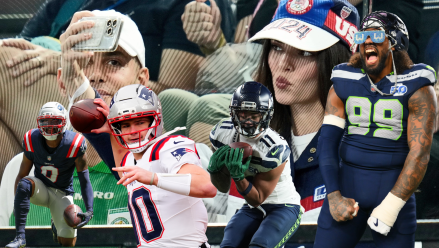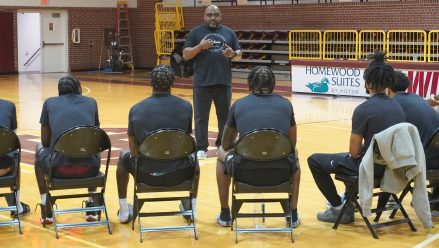“I just don’t really know what this has to do with gambling. If we are gambling, then I think you’re basically calling the entire financial market gambling.”
— Kalshi CEO Tarek Mansour, in an interview with Axios
“You’re not going to hear me say this isn’t sports betting. That’s a ridiculous comment.”
— Sporttrade founder and CEO Alex Kane, in an interview with Sportico
Those two quotes wouldn’t be terribly interesting if not for the fact both men are talking about the same thing: putting money down on the outcome of a sporting event. Mansour calls them “sports event contracts,” Kane calls them “bets.”
But both are operating prediction markets even if one of them sees it as gambling and the other doesn’t.
What they see it as may matter. Kane has petitioned the Commodity Futures Trading Commission (CFTC), asking it to let him bring his sports betting prediction markets nationwide. He makes no bones about what he’s offering, saying it’s sports betting.
Will the CFTC allow it, as it’s a near-mirror image of what Kalshi is offering? Or will the commission split hairs — and nouns and verbs — and not allow it because Kane is effectively showing the man behind the curtain?
So, is it sports betting or not?
Or maybe that’s the wrong question.
Maybe the real question we should be asking is — and you may want to sit down for this — what if sports betting isn’t gambling at all?
The financial argument
“I haven’t felt that I’m gambling anytime I’ve been actually ‘gambling’ for the past 20 years,” said Captain Jack Andrews, a longtime professional sports bettor and co-founder of Unabated. “For the most part, if I’m placing a bet on sports, I am pretty certain I have an edge, and my spreadsheets and my tracking have all proven that I do.”
This is the core of the argument: Unlike slot machines, roulette, coin flips — where outcomes are purely random — sports betting, at least done at Andrews’ level, involves analysis, research, and strategy. Professional bettors track their results and maintain positive ROIs over time. Is that really gambling, or is it closer to a form of short-term investment?
The evidence for the latter exists in plain sight. Wall Street firms such as Susquehanna International Group have established substantial sports trading operations. They approach sports betting markets with the same analytical rigor they apply to financial markets, using sophisticated algorithms and risk management techniques. They even serve as market makers for — wait for it — Kalshi and Sporttrade.
Alfonso Straffon, a former sports trader and current bond trader, outlined this parallel in stark terms in a letter to the CFTC, written before the much-ballyhooed roundtable discussion was nixed: “In the business of sports betting, the bookmaker (or operator) is no different than a market maker as defined in the world of financial markets, including those market makers authorized by the CFTC to provide liquidity on Designated Contract Markets.”
Straffon demonstrates this, showing how bookmakers and market makers perform identical functions. Both quote prices, both sometimes engage in riskless transactions when action is balanced, and both frequently take on principal risk when it isn’t.
“While they may quote prices differently,” Straffon noted, “they are in fact mathematically interchangeable.”
The letter pulls no punches: “Market makers are bookmakers, and bookmakers are market makers. While audacious, it is rather naïve and insulting to say otherwise.”
Regulatory ripples
The debate isn’t merely philosophical. It has potential implications for how sports betting may — may — be regulated in the future. In short: If you thought the Supreme Court overturning PASPA in 2018 was the last word, think again.
Congress retains the right to regulate sports betting and, if Kalshi gets its way, what we call “sports betting” today may be reclassified as something other than gambling — perhaps as a form of financial instrument or event contract. It could fall under federal jurisdiction through agencies like the CFTC or (don’t laugh) the Securities and Exchange Commission (SEC).
This possibility has caught the attention of industry insiders.
“If sports betting is not considered gambling, then the next question is whether it will be taken away from the states,” said Bruce Merati, founder of BetEx, a company that is seeking to allow sports betting operators to offer “tradeable bets,” much like a stock exchange. “This is highly unlikely, but, if it happens, then state operators will be out of business.”
Obviously, the ball is already kinda-sorta rolling in this direction. Kalshi, which is already regulated by the CFTC, is seeking approval to offer contracts on sporting events. It is able to do so — at least for now — because the CFTC hasn’t acted one way or another. Kalshi argues these aren’t gambling products but rather event contracts with legitimate economic purpose.
Critics say this is wordplay to get around gambling laws, but proponents argue there’s a genuine distinction worth exploring.
Straffon raises a fundamental question in his CFTC letter about the future of putting money on the outcomes of sporting events: “If powerful interest groups want sports betting to be regulated by a federal body so that they can expand across all states, while at the same time opening it up to institutional players, would it not be better for the Congress to create and pass a sports betting-specific Act that eliminates any ambiguity and sets a more solid foundation instead of having to rely on subjective interpretations, loopholes, and word-smithing?”
Macroeconomics
For sports betting to qualify as something other than gambling under current regulations, advocates point to its broader economic impact.
“There are definitely macroeconomic factors related to sports,” Andrews argued. “The performance of a player impacts what kind of contract he’s going to get, impacts how much the team’s going to spend, impacts ticket prices, impacts sponsorship deals, impacts the local community.”
This stands in contrast to typical casino gambling, which has no wider economic significance. Sports are major economic engines that drive billions in revenue, affect city development, and create entire ecosystems of related businesses.
Dennis Ehling, a gaming attorney for Blank Rome in Los Angeles, sees the merit in this argument but adds an important caveat: “Many people who take a position on sporting events have no such underlying economic interest to protect or hedge.”
Big shift?
The potential reclassification of sports betting wouldn’t be without precedent. Poker underwent a similar transformation in the public and legal consciousness, moving from being seen purely as gambling to being recognized as a game with substantial skill elements.
“Poker has kind of shifted,” Andrews noted. “The Obama administration basically clarified and said, ‘No, we’re not talking about poker in the Wire Act. Poker is a skill game.’ “
This shift led to a more nuanced understanding that allowed for interstate poker between several states — something prohibited for sports betting under the Wire Act.
Could sports betting follow a similar trajectory?
“I think the argument would actually be that sports betting is more than just gambling,” Andrews said. “Getting off of it being coupled in with a slot machine is probably an argument that deserves to be made.”
Ehling isn’t so sure.
“The fact that professionals can use strategies to give them edges does not change whether something is viewed as gambling,” he said. “Poker has professional strategies that increase a player’s chance of winning; so too is card-counting a strategy for blackjack that can significantly increase a player’s chance of winning. Horse racing has professional handicappers that use analytics and tracking to give the bettor an edge.
“These all are, nonetheless, considered gambling in most places,” he continued, “in large part because the strategies do not eliminate the effects of the element of chance and because the participants are not hedging an underlying economic position on the outcome of the event.”
The technological evolution of sports betting platforms also supports this reimagining, with newer platforms like Sporttrade and Kalshi functioning more like exchanges, where users can trade in and out of positions as odds fluctuate — much like buying and selling stocks. This creates a fundamentally different experience from traditional gambling.
What’s next?
The question of whether sports betting constitutes gambling won’t be resolved quickly. It would likely require congressional action to create a new regulatory framework, and many insiders don’t see that happening until at least 2027.
Ehling raises perhaps the most fundamental policy question of all.
“Who do we, as a matter of public policy, want to be regulating the taking of financial positions on the outcome of sporting events?” he asked. “A federal agency or state gaming regulators? Do we want the CFTC to deal with questions of retail-level AML, responsible gambling, corrupt influences on the underlying sporting events, age verification, and the like?”
While not suggesting the CFTC couldn’t handle these responsibilities, Ehling questions whether we want it overseeing transactions with “Joe or Jane Consumer.”
Straffon, for his part, sounds almost optimistic about the future of what we call “sports betting.”
“Never have I opposed the view that sport betting markets are no different than financial markets and would welcome it very much if it became institutionalized as such, instead of being put alongside games of pure chance and strictly under the umbrella of ‘entertainment,'” he wrote.
But he, too, advocates for a more deliberate approach than regulatory arbitrage, suggesting we “pull out a clean canvas instead, engage in more dialogue, and come up with a more solid and stable foundation for all stakeholders.”
Whether or not sports betting ultimately sheds its gambling classification, the current conversation challenges us to reconsider long-held assumptions. When millions of Americans are using sophisticated analytical tools to make calculated decisions about sporting outcomes, perhaps it’s time to ask: Is this really the same as playing slots?
For professional bettors who approach sports analytically, the answer seems clear. As Andrews puts it simply: “I don’t feel like I’m gambling.”
And you know what? Maybe he’s not.






